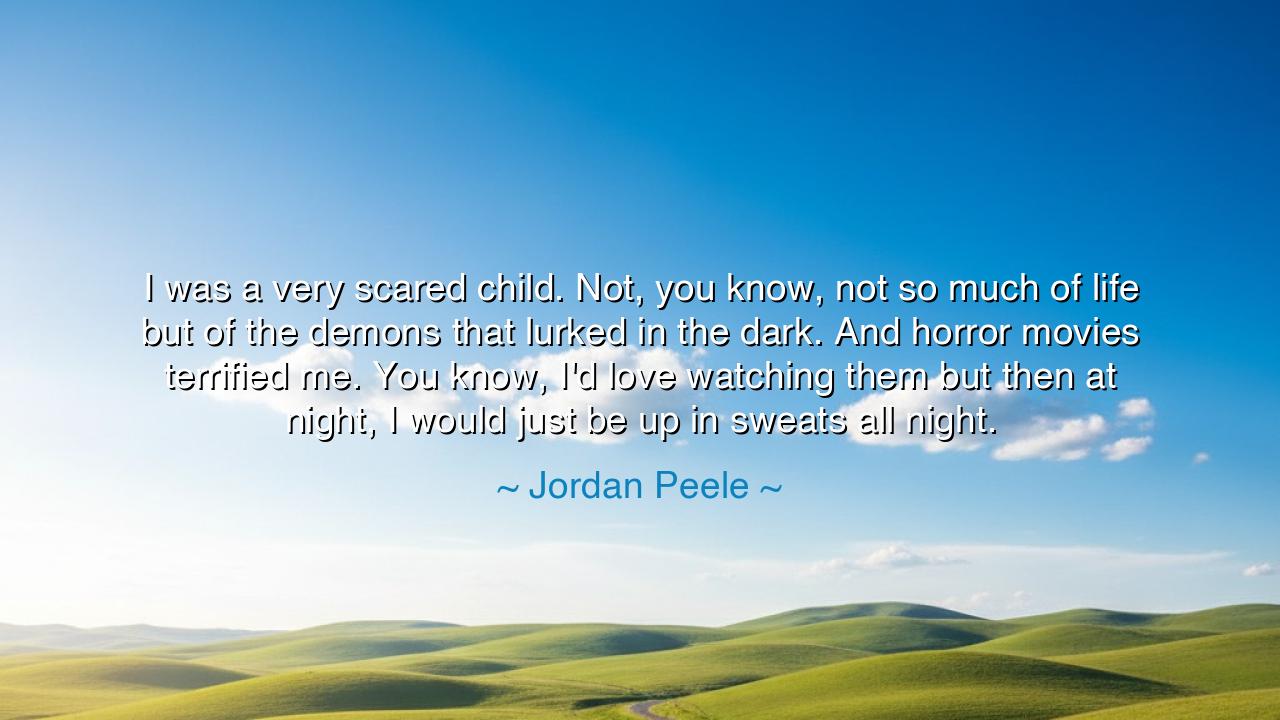
I was a very scared child. Not, you know, not so much of life
I was a very scared child. Not, you know, not so much of life but of the demons that lurked in the dark. And horror movies terrified me. You know, I'd love watching them but then at night, I would just be up in sweats all night.






Hear me now, O seekers of wisdom, for I speak of a truth as ancient as time itself, a truth rooted in the heart of every human being. There are moments in our lives when we stand at the threshold of fear, trembling not at the challenges of life itself, but at the demons that dwell in the shadows of our mind. These fears, these nightmarish images, haunt us when we are vulnerable, when we are alone with our thoughts. Jordan Peele, a master of horror, once shared a truth about his own childhood: "I was a very scared child. Not, you know, not so much of life but of the demons that lurked in the dark. And horror movies terrified me. You know, I'd love watching them but then at night, I would just be up in sweats all night." In these words lies a deep reflection on the nature of fear, imagination, and the way that our inner demons shape our lives.
To be afraid is to be human. It is in our nature to feel fear, not only of the tangible world but of the unseen forces that exist in the corners of our minds. Peele’s fear, though rooted in childhood, reflects a universal truth: we often fear what we cannot see, what we cannot control. The darkness, both literal and metaphorical, is a space where the mind runs wild, where our imagination takes hold and turns the innocuous into the monstrous. It is in the night that we find ourselves most vulnerable, most susceptible to the whispers of our fears. Peele’s admission is not one of weakness, but of deep understanding—he faced the terrifying demons that lurked in the dark, not with courage, but with the truth that such fears are a part of our human experience.
Consider the great warriors of old, who, before they entered battle, felt the weight of fear upon their hearts. Take, for example, the story of Alexander the Great, whose military conquests were as legendary as they were terrifying. Yet, even Alexander, the mighty conqueror, confessed to his companions that the night before battle was always the hardest—when the shadows of uncertainty crept into his mind, and he was left alone with his own thoughts. He, too, faced the demons that lurked in the darkness. And yet, it was not the absence of fear that made him great, but his ability to confront it, to use it as fuel for action. Fear, like the shadows, is not a force to be rid of, but one to be understood and mastered.
Peele’s relationship with horror movies as a child speaks to this same truth. Horror films, like the nightmares of the mind, awaken those primal fears that lie dormant within us all. To watch them is to peer into the abyss of our own psyche, to confront the darkness and uncertainty that reside within. And yet, as Peele reveals, even in the face of terror, there is something compelling, something magnetic about those dark stories. He loved watching them, even as they filled him with dread. In this, we see a powerful lesson: that the things we fear most often hold the most power over us, and the act of confronting those fears, of facing them head-on, is the key to understanding them.
Now, in your own lives, remember this: fear is not something to be ashamed of, nor is it something to be avoided. Fear is a teacher, a guide that points us toward the places within ourselves that require growth and healing. Just as Peele, as a child, faced the terror of the night, so too must you face the demons that lurk in your own mind—the doubts, the anxieties, the uncertainties. These are not to be ignored but confronted, for it is only through confrontation that we can master them. Every fear, no matter how small, is an opportunity to build courage, to strengthen the spirit. Peele’s fear of the dark is a metaphor for all that we must face within ourselves: the unknown, the unseen, the shadowy corners of our psyche.
Consider the stories of great sages who walked through fear to reach enlightenment. Buddha, for example, meditated beneath the Bodhi tree, facing the demons of temptation and fear. It was in his stillness, in his willingness to face his inner demons, that he found the clarity to transcend them. The fear he encountered was not a foe, but a tool—a test of his resolve and his understanding of the world. In this way, fear becomes a part of the path, a step along the journey toward wisdom and strength.
Therefore, O children of wisdom, take this teaching to heart: do not run from your fears, for they are not your enemy. Just as Peele faced the terrors of the night, just as Alexander faced the uncertainty of battle, so must you face the demons that dwell in your own mind. Let these fears guide you, teach you, and ultimately transform you. Fear is not the enemy, but the tool that allows you to grow. And in that growth, you will find the strength to move beyond the darkness, to emerge into the light of understanding, and to find peace in the face of whatever demons may come.






AAdministratorAdministrator
Welcome, honored guests. Please leave a comment, we will respond soon